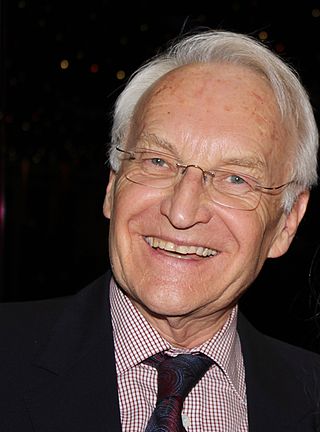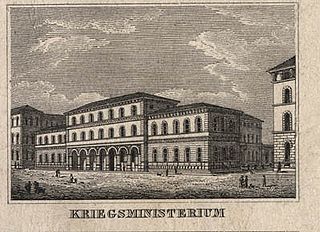
Bavaria, officially the Free State of Bavaria, is a state in the southeast of Germany. With an area of 70,550.19 km2 (27,239.58 sq mi), it is the largest German state by land area, comprising roughly a fifth of the total land area of Germany, and with over 13.08 million inhabitants, it is the second most populous German state, behind only North Rhine-Westphalia; however, due to its large land area, its population density is below the German average. Major cities include Munich, Nuremberg, and Augsburg.

Edmund Rüdiger Stoiber is a German politician who served as the 16th minister-president of the state of Bavaria between 1993 and 2007 and chairman of the Christian Social Union (CSU) between 1999 and 2007. In 2002, he ran for the office of Chancellor of Germany in the federal election, and in one of the narrowest elections in German history lost against Gerhard Schröder. On 18 January 2007, he announced that he would step down as minister-president and as party chairman by 30 September, after having been under fire in his own party for weeks.

Franz Bonaventura Adalbert Maria Herzog von Bayern, commonly known by the courtesy title Duke of Bavaria, is the head of the House of Wittelsbach, the former ruling family of the Kingdom of Bavaria. His great-grandfather King Ludwig III was the last ruling monarch of Bavaria, being deposed in 1918.

Bayerischer Rundfunk, shortened to BR, is a public-service radio and television broadcaster, based in Munich, capital city of the Free State of Bavaria in Germany. BR is a member organization of the ARD consortium of public broadcasters in Germany.

The University of Music and Theatre Munich, also known as the Munich Conservatory, is a performing arts conservatory in Munich, Germany. The main building it currently occupies is the former Führerbau of the NSDAP, located at Arcisstraße 12, on the eastern side of the Königsplatz. Teaching and other events also take place at Luisenstraße 37a, Gasteig, the Prinzregententheater, and in Wilhelmstraße (ballet). Since 2008, the Richard Strauss Conservatory, until then independent, has formed part of the university.

Franz Matt was a German lawyer, politician and minister, who belonged to the Bavarian People's Party (BVP). Following the revolution, he substantially defined and put through Bavarian cultural and educational policy.
Jakob Ritter von Danner was a general in the Royal Bavarian Army, the Imperial German Army and the Reichswehr. As commandant of the Munich garrison of the Reichswehr, he was a central figure in putting down the attempted Beer Hall Putsch by Adolf Hitler and the Nazis in 1923.

The most famous league derbies in Bavarian football are the games between FC Bayern Munich and 1. FC Nürnberg, with the Bayern versus TSV 1860 Munich matchups coming a close second. Traditionally, 1. FC Nürnberg versus SpVgg Fürth is also of historical significance as, especially during the 1920s, those two clubs were dominant forces in German football. A distant fourth comes the Augsburg derby, at times played on highest level in the past, too.

The Gau Munich–Upper Bavaria was an administrative division of Nazi Germany in Upper Bavaria from 1933 to 1945. From 1930 to 1933, it was the regional subdivision of the Nazi Party in that area.
The Bavarian Film Awards have been awarded annually since 1979 by the state government of Bavaria in Germany for "exceptional achievement in German filmmaking." Along with the German Film Awards, these are the most highly regarded awards for filmmaking achievement in Germany.

The Ministry of War was a ministry for military affairs of the Kingdom of Bavaria, founded as Ministerium des Kriegswesens on October 1, 1808 by King Maximilian I Joseph of Bavaria. It was located on the Ludwigstraße in Munich. Today the building, which was built by Leo von Klenze between 1824 and 1830, houses the Bavarian public record office, Bayerisches Hauptstaatsarchiv und Staatsarchiv München.
The Bavarian monarchy ended with the declaration of a republic after the Anif declaration by King Ludwig III on 12 November 1918 as a consequence of Germany's defeat in the First World War. Monarchism was thereafter particularly strong between 1918 and 1933, when an attempt was made to either make Crown Prince Rupprecht king or general state commissioner in an attempt to forestall the rise of the Nazis to power in the state.

The Bavarian Maximilian Order for Science and Art was first established on 28 November 1853 by King Maximilian II von Bayern. It is awarded to acknowledge and reward excellent and outstanding achievements in the field of science and art. From 1933 onwards the order was no longer awarded, until 1980 when it was reinstated by the then Minister-President of the Free State of Bavaria Franz Josef Strauß. Munich jewellers Hemmerle have been responsible for making the medal since 1905.

The Munich International Film Festival is the largest summer film festival in Germany and second only in size and importance to the Berlinale. It has been held annually since 1983 and takes place in late June or early July. The latest festival was held from June 23 to July 2, 2022. It presents feature films and feature-length documentaries. The festival is also proud of the role it plays in discovering talented and innovative young filmmakers. With the exception of retrospectives, tributes and homages, all of the films screened are German premieres and many are European and world premieres. There are a dozen competitions with prizes worth over €250,000 which are donated by the festival's major sponsors and partners.
The Medientage München are held annually in Munich as a congress of the communications industry. An exhibition is organized and occurs at the same time. Every year in October, media entrepreneurs, media makers, and media politicians meet for three days. In 2015 more than 6,200 participants attended the congress, exhibition and events around the Medientage München.
Michael Doeberl was a German historian who specialized in Bavarian history.

The following outline is provided as an overview of and topical guide to Munich:

The 2018 Bavarian state election took place on 14 October 2018 to elect the 180 members of the 18th Landtag of Bavaria. The outgoing government was a majority of the Christian Social Union in Bavaria (CSU), led by Minister President Markus Söder.
The Institute of Bavarian History at the Ludwig Maximilian University (Ludwig-Maximilians-Universität) in Munich is a centre of research and teaching of Bavarian history in a European context. It is located in the building complex of the Bavarian State Archives and in the immediate vicinity of the Bavarian State Library.

Florian Herrmann is a German lawyer and politician (CSU). He has been a member of the Bavarian State Parliament since 2008, Head of the Bavarian State Chancellery and Bavarian Minister of State for Federal and European Affairs and the Media since 2018, and for Federal Affairs and the Media since 2021.














